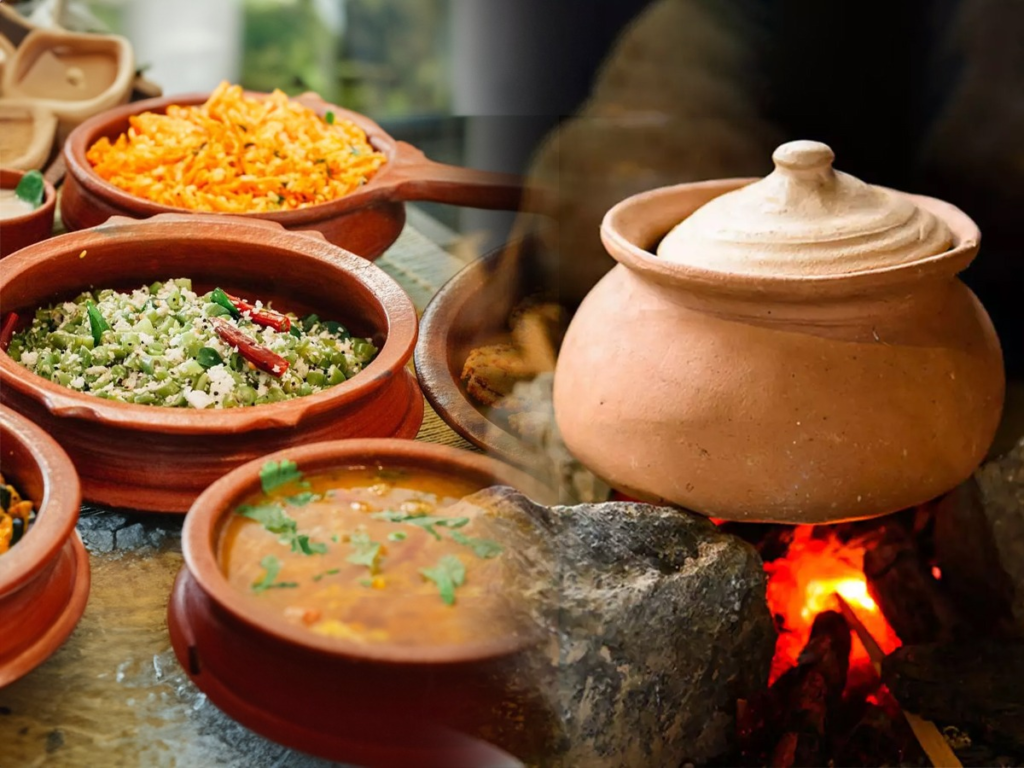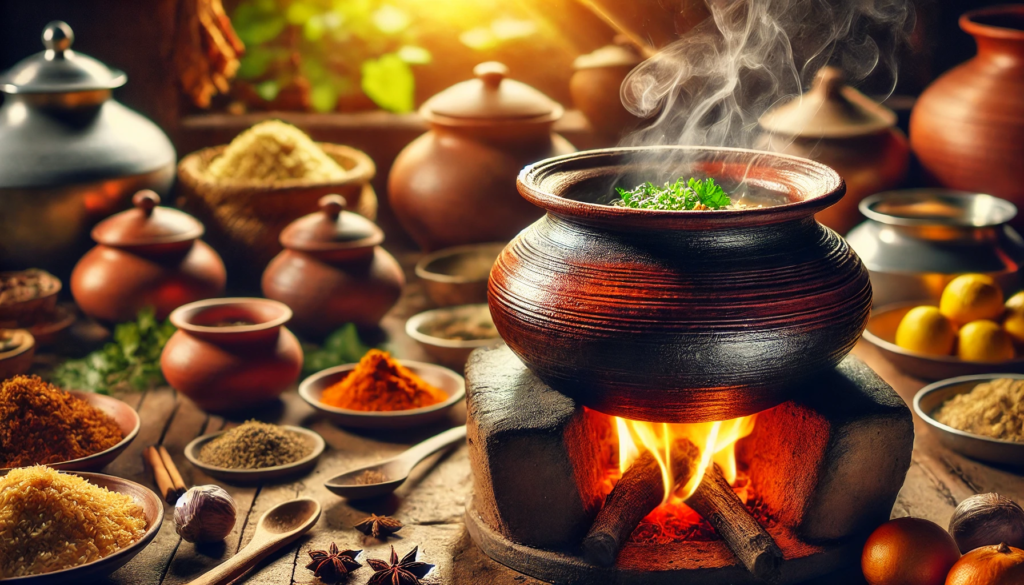What are the benefits of cooking food in Clay Pots/ Earthenware!

In our fast-paced, modern kitchens filled with non-stick pans and steel cookware, the humble earthen pot might seem like a relic from the past. However, this traditional Indian cooking vessel has been making a comeback—and for good reason! Cooking in earthen pots isn’t just about nostalgia; it’s a healthy, eco-friendly choice that enhances the flavors of your meals.
Cooking in clay pots is beneficial as it enhances nutritional value by preserving essential minerals such as iron, calcium, and magnesium. Traditional Indian cooking relied on clay pots, and recent studies confirm that cooking in these vessels can help reduce malnutrition. The porous nature of clay ensures even heat distribution and helps retain food’s natural flavor and nutrients. It also helps balance the food’s pH, aiding in digestion. Modern clay pot designs are both functional and aesthetically pleasing, making them ideal for healthier cooking.
Let’s explore why you should consider going back to the basics with earthen cookware.
1. Natural, Non-Toxic Cooking
Unlike non-stick pans, which often contain chemicals that can leach into food at high temperatures, earthen pots are made entirely of natural clay. This clay is free from toxic additives and is safe to cook food in at any temperature. Traditionally, Indian households would soak earthen pots before their first use, letting them absorb water and preparing them for slow, even cooking. This natural seasoning creates a safe, non-toxic layer that improves with each use.
2. Enhanced Flavors
One of the most popular reasons for using earthen pots is the unique, earthy flavor they impart to food. The porous surface of clay pots allows steam to circulate slowly, trapping the natural flavors and moisture of the ingredients. This is why dals, curries, and even rice cooked in an earthen pot have a depth of taste that’s hard to replicate in metal cookware. In fact, dishes like dal makhani and khichdi—Indian comfort foods—have a rich, distinct taste when slow-cooked in clay pots over a low flame.
3. Nutrient Preservation and Health Benefits
Earthen pots cook food slowly, at relatively low temperatures, helping to retain essential nutrients that might otherwise be lost. Minerals like calcium, phosphorus, iron, and magnesium from the clay are naturally absorbed into the food, adding a healthy boost. In India, many people believe that earthen pot cooking helps balance acidity in the body, especially when making naturally acidic foods like tamarind rice or sambar.
4. Heat Retention and Even Cooking
Clay pots retain heat for a long time, keeping food warm without needing constant reheating. This even heat distribution means you can cook without worrying about burning or overcooking certain parts of the dish. Traditional Indian cooking, especially recipes that require simmering or slow cooking—such as rajma (kidney beans) or chole (chickpeas)—benefits greatly from this heat retention, resulting in soft, flavorful pulses and spices that blend beautifully over time.

5. Environmentally Friendly Choice
Earthen pots are biodegradable, made from natural clay, and don’t harm the environment when discarded. Unlike plastic and metal cookware, which require extensive manufacturing and produce waste, earthen pots are an eco-friendly alternative. In India, potters have been handcrafting clay pots for generations using locally-sourced materials, making it a sustainable option that supports local artisans and preserves traditional craftsmanship.
6. Affordable and Easily Available
Earthen pots are highly affordable compared to modern cookware. They’re available in various sizes and shapes to suit different cooking needs—from deep pots for curries to flat, wide pots for frying and even for making roti. You can find them at local markets or online, and they come pre-seasoned or ready for seasoning at home.
Tips for Cooking in Earthen Pots
To get the most out of your clay pot, here are some easy tips:
- Soak Before Use: Always soak a new clay pot in water for a few hours before using it. This prevents the pot from cracking and allows it to retain moisture for even cooking.
- Start on a Low Flame: Earthen pots need to be heated gradually, so start on a low flame and slowly increase the heat as needed.
- Avoid Sudden Temperature Changes: Don’t expose a hot pot to cold water, as this can cause it to crack. Let it cool down before washing.
- Season the Pot Regularly: A light oil coating after each use helps season the pot over time, building up a natural, non-stick surface.
- Use Wooden Spoons: Avoid metal spoons, which can scratch the pot’s interior. Wooden or silicone utensils are ideal for stirring and serving.
Getting Back to the Basics
Earthen pots remind us of the slow-cooked, hearty meals our grandparents made with care and love. This simple, natural way of cooking can help you rediscover the pleasure of homemade food with enhanced flavors and added nutrition. Embracing earthen cookware is a small step toward a healthier lifestyle and a more sustainable kitchen. So, the next time you’re planning a meal, try going back to the basics—your taste buds and body will thank you!

Thank you for joining Prachi The Tatwa Girl. 🌿Read on various panchtatwa topics by #TheTatwaGirl.
Agni – The Fire Tatwa – Under this element, I write about food. Inspired by the energy and life force of this element, I share special recipes and culinary creations.
Vayu – The Air Tatwa – In this element, I write about things around us, the cultures and festivals being celebrated. Traditions followed and mythology and beliefs of a particular place.
Aakash – The Sky Tatwa – Here, I write about my travel experiences. Here, I describe the infinite skies and towering mountain peaks I encounter during my journeys.
Jal – The Water Tatwa – Here, I express my inner emotions, just like the flowing and ever-moving water. This is a reflection of the continuous flow of my thoughts.
Prithvi – The Earth Tatwa – In the earth element, I focus on environmental issues and eco-friendly lifestyle solutions. This includes ways to live in harmony with our planet. In today’s world, sustainable development has become a necessity. Don’t miss the Green Tatwa Talks podcast, and explore eco-friendly, sustainable living practices from awesome Green warriors I have interviewed, who work towards protecting the environment and bringing about positive change.
Subscribe on LinkedIn and get EcoFriendly with Prachi.
Follow The Tatwa Girl
Check PragunTatwa Feed
For more Eco-Friendly content visit my Instagram Feed.
Don’t forget to hug a tree and learn more about the Trees around you on Tree Talks.








Recent Comments